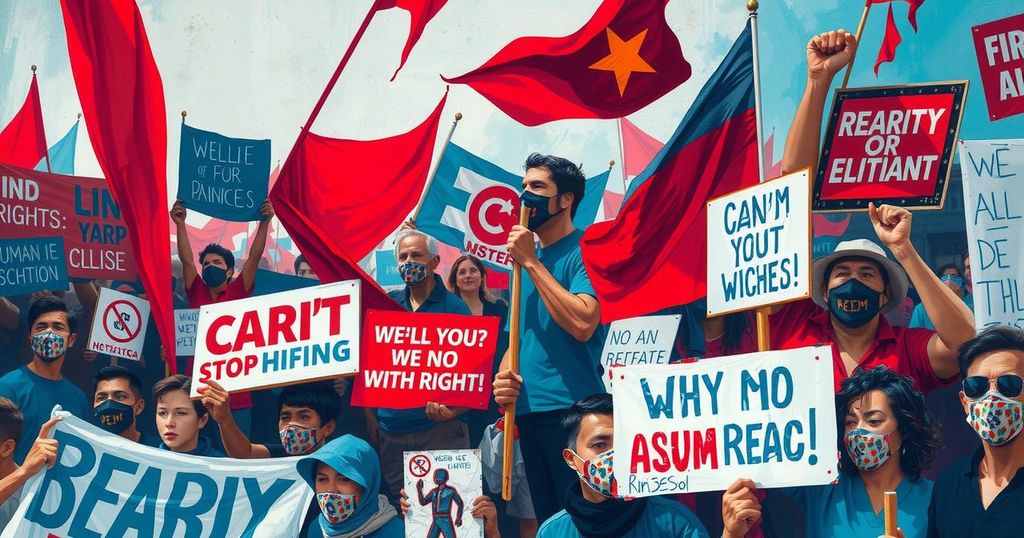Iran Protests Continue Amid Rising Discontent and Human Rights Violations

Protests erupt across Iran as citizens voice discontent with government policies; global exhibitions highlight human rights abuses. Legal proceedings in the UK against Iranian spies come to light. Rising crime indicates deeper societal issues amid systemic failures.
In a wave of protests that continues to reverberate across Iran, retirees, workers, and various social groups took to the streets in late May and early June to express their dissatisfaction with the government’s policies, rampant corruption, and dire economic conditions. These demonstrations highlight the resilience of the Iranian populace, showcasing their determination to claim their rights despite oppressive government measures intended to stifle dissent.
On June 6, activities by Resistance Units in Zahedan, a city known for its stringent security measures and increasing executions, sought to challenge the prevailing atmosphere of fear instilled by the government. This apparent push for change occurs as the regime intensifies threats of death sentences, specifically targeting supporters of the People’s Mojahedin Organization of Iran (PMOI/MEK). The stakes are high as these actions come amid a climate of fear and repression.
Meanwhile, across Europe, exhibitions organized by PMOI/MEK supporters have brought the Iranian regime’s human rights abuses to international attention. In Bucharest, Romania, on June 7, an exhibition highlighted the severe human rights violations, particularly focusing on death sentences for political prisoners. This exhibition served as a rallying point for calls to release those imprisoned for their beliefs.
Similarly, in Rostock, Germany, an exhibition on the same day voiced protests against executions and demanded immediate release for political prisoners currently detained. MEK supporters in this location urged for the prosecution of Iranian leaders for their crimes against humanity in an international setting, a sentiment echoed by participants across various exhibitions.
On that same day, Berlin hosted another PMOI/MEK exhibition condemning the regime’s intensified human rights violations, particularly the grim reality of death sentences imposed on political dissenters. Exhibitions in Bern, Switzerland, further drove home these messages, echoing the calls for accountability and action against the Iranian government’s policies.
In legal news, three Iranian individuals charged with espionage for Tehran will face trial in the UK in the fall of 2026. These men—Mostafa Sepahvand, Farhad Javadi Manesh, and Shapur Ghaleh Alikhani Noori—appear set to plead not guilty to the accusations, as per announcements made during their preliminary hearing.
On another front, the recent murders of Amir Mohammad Khaleghi and Elaheh Hosseinnejad have highlighted the growing insecurity and escalating crime rates in Iranian cities. These tragic events indicate not merely individual tragedies but a concerning societal breakdown rooted in systemic issues and economic despair.
Examining the Iranian regime’s tactics more closely reveals a methodical expansion of repressive measures. The regime employs a phased approach, trialing aggressive policies in selected areas before rolling them out more broadly. This strategy reflects an adaptive response to civil liberties, demonstrating a calculated effort to maintain control.
In a stark reminder of the regime’s brutal nature, one activist has warned of its potential use of nuclear weapons against perceived enemies. Fereshteh, an Iranian IT researcher, detailed her harrowing experiences that drove her to join the resistance after the regime tortured and executed her sister. She emphasized the urgency of the crisis, describing a nation living under extreme poverty and oppression, suggesting that Iran is a ‘ticking time bomb’ amid rising tensions.
The ongoing protests in Iran emphasize the public’s dissatisfaction with harsh government policies and economic hardship. Simultaneously, international exhibitions continue to raise awareness of human rights abuses perpetrated by the Iranian regime. The legal situation for those charged with espionage in the UK also highlights a global dimension to these issues. As local and international efforts to combat the regime’s oppression intensify, the future remains uncertain for both Iranian society and its leadership.
Original Source: www.ncr-iran.org






